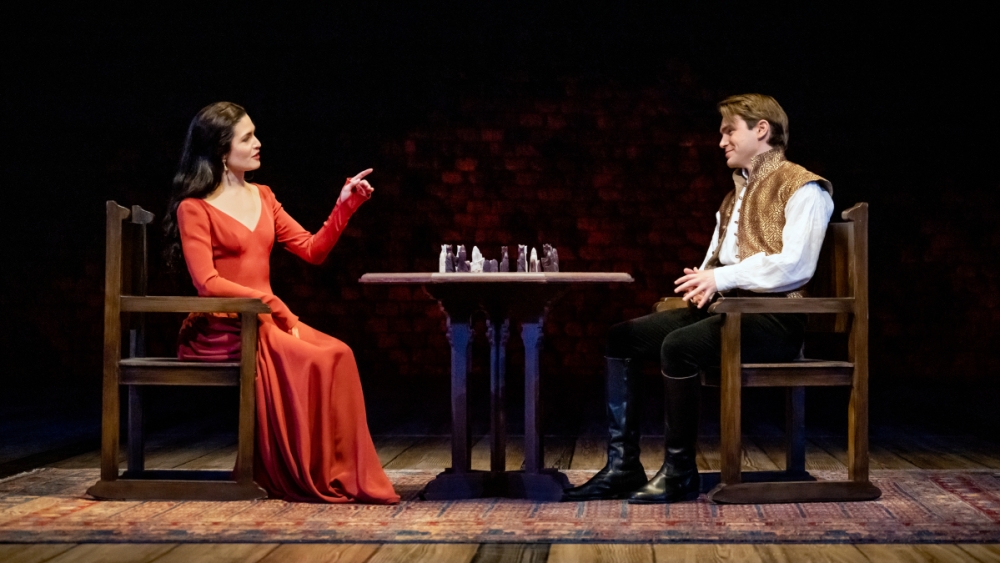‘Camelot’ Review: Aaron Sorkin’s Rethink of Broadway Musical
In Aaron Sorkin’s revised script for Lincoln Center Theater’s new Broadway production of “Camelot,” the magic is missing — in more ways than one.
The declared aim of the stage, TV and film writer (“To Kill a Mockingbird,” “The West Wing,” “The Social Network”) was to eliminate the fantastical elements in the 1960 musical and prune its cumbersome book, based on T.H. White’s books of King Arthur and the tales of the knights of the round table. Sorkin makes his version more about human aspirations, choices and failings — plus a little politics — rather than potions, prophecies and sorcery.
But in its place Sorkin and the veteran director Bartlett Sher (“South Pacific,” “The King and I”) jettison much of the fun, too. What remains is a cooler “Camelot,” with its own head-scratching dramaturgy. In making the three central characters — King Arthur (Andrew Burnap), Queen Guenevere (Phillipa Soo) and Sir Lancelot (Jordan Donica) — all tied up in emotional knots yet strangely aloof, the production’s creative team also deprives the show of much of its heart, joy and romance.
Even the cherished title song — in which Arthur gently woos a reluctant Guenevere in their first extended meet-cute scene — is the subject of mocking. Soo’s Guenevere here seems only mildly won over by Arthur, and it’s an attitude that prevails for most of the show.
Though this production’s humorless Lancelot professes his profound love for the queen, it’s hardly reciprocal. It seems their singular tryst becomes for her more of a one-knight stand, and it hardly solves the problematic issue of an audience’s divided feelings towards the character.
A Tony Award winner for “The Inheritance,” Burnap creates an inherently likable and boyish Arthur, tossing off asides with natural ease and nicely tapping into his commoner-to-king insecurities. This Arthur is unmoored following the death of Merlin (Dakin Matthews, a delight), here presented as wizened advisor rather than advising wizard. (Matthews is double cast as befuddled royal advisor Pellinore, a character that remains a bit of a mess but is at least amusing throughout.)
Without Merlin to guide him, it’s clear that Arthur is an emotionally awkward monarch who has no clue how to talk to a woman — much how to less handle one, to quote the Act I song. Burnap at least sings “How to Handle a Woman” touchingly, even if it feels begrudgingly retained and shortened.
But pity Arthur, who as a 15-year-old servant unknowingly and amazingly pulled a royal sword from the stone and became an instant king. Guenevere suggests that perhaps Excalibur was simply loosened after so many tries, deflating the tale and turning the legend into a lucky pull.
Guinevere is presented here as a woman who is much more than a pawn in a peace accord. Soo personifies beauty, brains and defiance, and shows off an elegant soprano that shines in songs “The Simple Joys of Maidenhood,””The Lusty Month of May” and “Take Me to the Fair.” But her Guinevere is also chilly and distant, and when she professes in the end that she loved Arthur all along, one has to pause and wonder if she was talking about the film version.
As for the king’s entitled knights (Anthony Michael Lopez, Fergie Philippe and Danny Wolohan), they’re all hostile to Arthur’s new vision of rule of law and equality for all. Only Lancelot is inspired by the king’s mission , but he’s unlikely to convince others with his stiff and boring earnestness. There’s precious little playfulness, just loud matter-of-factness in his rendition of “C’est Moi.”
Donica scores better in the swoon-worthy ballad “If Ever I Would Leave You,” but Soo’s Guinevere seems relatively fine with his exit. In this version it’s the besotted Lancelot, not Guenevere who sings “I Loved You Once in Silence.”
There are other narrative and character choices that also feel odd or clunky. Curiously, it’s Lancelot who revives Arthur from a near-death impact in a swordfight (terrifically staged by B.H. Barry) instead of the fallen knight from the original version. Then there’s the out-of-the blue arrival of Arthur’s bastard son Mordred (Taylor Trensch), a Gen-Z medieval — and just plain evil, but not in a fun way. There’s also a perplexing backstory scene between Arthur and Morgan Le Fey (Marilee Talkington), a sorceress in previous versions who has been transformed here into Mordred’s unstable mom and a Middle Ages scientist.
While previous, wan revivals turned out to be more “Camelittle,” Lincoln Center at least has delivered the goods in a fulsome production featuring a 27-member cast and a 30-piece orchestra under Kimberly Grigsby’s music direction and baton, bringing the Lerner and Loewe score music to glorious life. For many fans, that will be worth the ticket.
Set designer Michael Yeargan’s stunning series of giant arches make it all tastefully palatial — and a beautiful snow globe of an opening design makes full use of the expanse of the Vivian Beaumont stage. Lap Chi Chu’s lightning, Jennifer Moeller’s costumes and atmospheric projections by 59 Productions also add to the sense of majesty and wonder so missing in the rest of the show.

